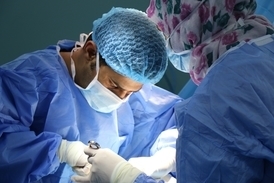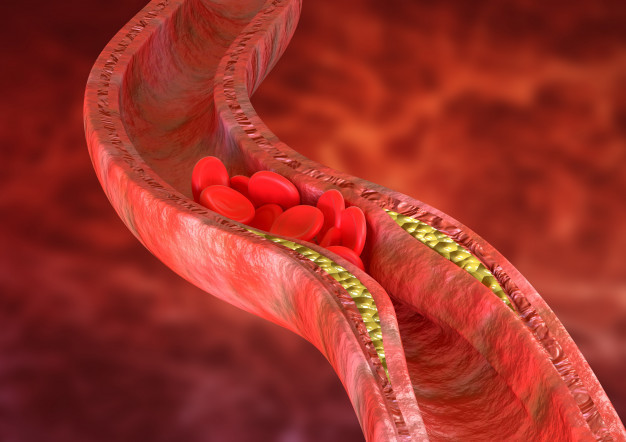भारत में कोरोनरी एंजियोप्लास्टी का खर्च
Coronary Angioplasty is a medical procedure used to open narrowed coronary arteries. This procedure uses stents to widen a blocked artery. This process allows the blood to flow through the respective artery freely. Coronary Angioplasty is used to prevent symptoms of atherosclerosis.
भारत में कोरोनरी एंजियोप्लास्टी की अनुमानित लागत
भारत में कोरोनरी एंजियोप्लास्टी के लिए सबसे अच्छे डॉक्टर की सूची
एमबीबीएस, एमएस - सर्जरी, पीएचडी - हृदय सर्जरी
प्रमुख - कार्डियक साइंसेज और चीफ - कार्डियो संवहनी सर्जरी और नैदानिक सेवाएं
41 वर्षों का अनुभव, 3 पुरस्कार
बाल चिकित्सा कार्डियक सर्जरी
MBBS, एमडी - चिकित्सा, डीएम - कार्डियोलॉजी
सलाहकार - कार्डियोलॉजी
13 वर्षों का अनुभव,
हृदय शल्य चिकित्सा
MBBS, एमएस - जनरल सर्जरी, मच - CTVS
विभागाध्यक्ष और वरिष्ठ सलाहकार - कार्डियोथोरेसिक और संवहनी सर्जरी
23 वर्षों का अनुभव,
हृदय शल्य चिकित्सा
एमबीबीएस, एमडी - जनरल मेडिसिन, डीएम - कार्डियोलोजी
मुख्य और वरिष्ठ सलाहकार - कार्डियोलॉजी
25 वर्षों का अनुभव, 2 पुरस्कार
बाल चिकित्सा कार्डियक सर्जरी
भारत में कोरोनरी एंजियोप्लास्टी के लिए सबसे अच्छे अस्पतालों की सूची

No.71/1, मिलर्स रोड, ऑप। सेंट ऐनी कॉलेज, बैंगलोर, कर्नाटक, 560052, भारत
220 बेड
बहु विशेषता

98, कोडिहल्ली, हैल बस स्टॉप के पास, एचएएल एयरपोर्ट रोड, बैंगलोर, कर्नाटक, 560017, भारत
650 बेड
बहु विशेषता

4/112, माउंट पूनमले रोड, Manapakkam, चेन्नई, तमिलनाडु, 600089, भारत
1000 बिस्तर
बहु विशेषता

मानव देखभाल चिकित्सा धर्मार्थ ट्रस्ट, नई दिल्ली, 110075, भारत
बहु विशेषता

कोई 8, एचसीजी टावर्स, पी कलिंग राव रोड, Sampangiram नगर, बैंगलोर, कर्नाटक, 560027, भारत
200 बेड
एकल विशेषता
क्रेडिफ़ेल्थ एक ऑनलाइन चिकित्सा सहायता पोर्टल है जो भारत में कोरोनरी एंजियोप्लास्टी परीक्षण लागत से संबंधित आपके सभी चिकित्सा प्रश्नों को सहायता और उत्तर प्रदान करता है। आप अपने शहर के अस्पतालों की एक विस्तृत श्रृंखला से चयन कर सकते हैं। डॉक्टर प्रोफाइल, ओपीडी शेड्यूल के माध्यम से जाएं और सत्यापित जानकारी प्राप्त करें। ऑनलाइन अपॉइंटमेंट बुक करके, भारत में कोरोनरी एंजियोप्लास्टी लागत पर अनन्य छूट और ऑफ़र का लाभ उठाते हैं।
भारत में कोरोनरी एंजियोप्लास्टी का औसत खर्च क्या है?
में कोरोनरी एंजियोप्लास्टी का खर्च Rs. 58,000 से शुरू होती है जो कई कारकों पर निर्भर करती है। The average cost of Coronary Angioplasty in भारत may range from Rs. 58,000 to Rs. 1,16,000.
कोरोनरी एंजियोप्लास्टी के संकेत
Your general physician would recommend you to consult with a cardiologist. Your cardiologist will suggest coronary angioplasty based on your symptoms. This procedure is done to treat or ease the symptoms of the following conditions:
Unstable angina
Coronary Artery Disease
Ischemia
Single Vessel Disease/Double vessel disease
Atherosclerosis
कोरोनरी एंजियोप्लास्टी करने से पहले के दिशानिर्देश
Firstly, your doctor will decide whether angioplasty will be helpful for your condition or not. To decide this, he/she will ask you to have a Coronary Angiogram (Angiography). An angiogram is an X-ray of inside the arteries. Check the angiography cost in Delhi NCR and prepare for angioplasty.
If your doctor finds a blockage in your arteries, he/she will recommend coronary angioplasty at the earliest.
Fasting: You will be asked to not eat or drink anything for at least 6-8 hours before the procedure.
Tests: Chest X-rays, echocardiograms, and Blood tests are done before an angioplasty.
Medicines: You will have to inform your doctor about the medications you take. He/she may ask you to discontinue some medicines. If you take medicines to control diabetes, don’t forget to mention it to the doctor.
Allergies: You should inform your doctor if you are allergic to anything, especially special dyes.
कोरोनरी एंजियोप्लास्टी के दौरान क्या होता है
A coronary angioplasty is performed using a local anesthetic, which means you'll be awake while the procedure is carried out.
A thin flexible tube called a catheter will be inserted into one of your arteries through an incision in your groin, wrist or arm. This is guided to the affected coronary artery using an X-ray video.
When the catheter is in place, a thin wire is guided down the length of the affected coronary artery, delivering a small balloon to the affected section of the artery. This is then inflated to widen the artery, squashing fatty deposits against the artery wall so blood can flow through it more freely when the deflated balloon is removed.
If a stent is being used, this will be around the balloon before it's inserted. The stent will expand when the balloon is inflated and remains in place when the balloon is deflated and removed.
A coronary angioplasty usually takes between 30 minutes and 2 hours. If you're being treated for angina, you'll normally be able to go home later the same day or the day after you have the procedure.
You'll need to avoid heavy lifting, strenuous activities and driving for at least a week.
If you've been admitted to hospital following a heart attack, you may need to stay in the hospital for several days after the angioplasty procedure before going home.
कोरोनरी एंजियोप्लास्टी के बाद के दिशानिर्देश
After coronary angioplasty, you will be asked to stay in the hospital for monitoring purposes. You should follow the underlying steps, post-procedure:
Drink a lot of water: It is important to flush out the dye from your body. You must drink plenty of fluids so that the dye is removed from your body through urine.
Physical activity: Avoid heavy physical exercises or lifting heavy objects after the procedure.
Get instructions from the doctor: You should sit with your doctor to discuss post-procedure instructions about do’s and don’ts. You should also ask how your medications should be taken.
कोरोनरी एंजियोप्लास्टी के जोखिम और जटिलताएं
Coronary angioplasty is a safe procedure if performed by a professional. It is a preferred procedure to treat CAD. However, these procedures pose certain health risks and complications. Some of the conditions that can arise as a risk from coronary angioplasty are:
Re-narrowing of arteries
Heart attack
Irregular heartbeat
Kidney problems
Blood clot
Stroke
Bleeding
For more information on angioplasty cost in Delhi, contact Credihealth Medical Experts at 8010-994-994.
डॉक्टर संबंधित वीडियो
अक्सर पूछे जाने वाले प्रश्न
Q: कोरोनरी एंजियोप्लास्टी के बाद कितने दिनों के आराम को लिया जाना चाहिए? 
A: आराम के दिनों की संख्या प्रक्रिया के प्रकार पर निर्भर करती है। कोई कुछ दिनों के भीतर अपने सामान्य जीवन में लौट सकता है या प्रक्रिया के एक सप्ताह बाद ले जा सकता है।
Q: कौन कोरोनरी एंजियोप्लास्टी प्रक्रिया करता है और कहां? 
A: कोरोनरी एंजियोप्लास्टी एक कार्डियोलॉजिस्ट द्वारा एक कार्डियक लैब में विशेष कार्डियोवस्कुलर नर्सों और तकनीशियनों की टीम के साथ किया जाता है।
Q: क्या एंजियोप्लास्टी एक दर्द रहित प्रक्रिया है? 
A: हां, पूरी प्रक्रिया परेशानी मुक्त और दर्द रहित है।
Q: एंजियोप्लास्टी किस प्रकार का डॉक्टर है? 
A:
इंटरवेंशनल कार्डियोलॉजिस्ट या कार्डियोलॉजिस्ट जिनके पास हृदय के इलाज में विशेषज्ञता है & amp; पतली, लचीली ट्यूबों के साथ हृदय संबंधी विकार एंजियोप्लास्टी करते हैं।
Q: क्या एंजियोप्लास्टी किसी भी एलर्जी की प्रतिक्रिया में परिणाम करती है? 
A: कभी -कभी, एक मरीज को पीठ, गर्दन, जबड़े, पेट, हाथ, सांस की तकलीफ, मतली, या उल्टी में दर्द या दर्द का अनुभव हो सकता है। लेकिन यह अस्थायी है और अपने दम पर चला जाता है।



